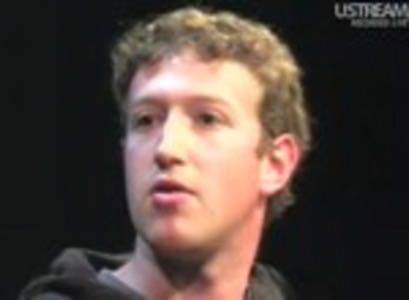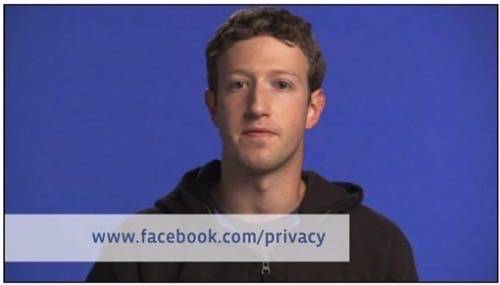Facebook founder Mark Zuckerberg just led a phone call for the press announcing a number of substantial changes to Facebook’s fluid and controversial privacy policy. Today’s changes were good for users concerned about privacy, but Zuckerberg’s tone on the call was odd.

He said a number of things that seemed of questionable…truth. Those were: that settings weren’t changed arbitrarily when all this began in December, that the changes weren’t driven by advertising and business concerns and that Facebook makes its decisions based not on criticism but on metrics or its belief in what the right thing to do is.

Above: Zuckerberg released a related 3 minute video this afternoon.
“We didn’t change any settings.”
So which is it? Does Facebook listen to the rumbling and grumbling of everyday Farmville players as its primary strategic compass, or does it do what it as a company thinks is the right thing to do, regardless of users’ feelings? Does it measure what the right thing to do is out of commercial concerns or a desire to change the world? Is it in fact trying to change the world, or is it merely reflecting the way the world is already changing? We’ve heard all these conflicting arguements for months and it’s unclear what exactly is going on.
Zuckerberg began the call today with a long and detailed history of the site, its growth and its changing privacy policy over time. When he got to the part of that history concerning the radical change in privacy defaults last December he described it like this: “We asked people to reevaluate their privacy settings, but we didn’t change any settings.”
Perhaps that was a slip of the tongue, a mistaken oversimplification of how Zuckerberg intepreted things. It sure doesn’t seem true, though.
Last December people who had never changed any of their privacy settings had their new defaults set to share far more content publicly, with the world at large. The prompt to re-evaluate was a chance to opt-out of the new changes, but those settings and the defaults were certainly changed.
Likewise, a number of things that could be kept private among trusted friends prior to December became irretrievably public. Friends lists and interest pages subscribed to – what was called becoming a Fan then and is now “Liking” something – were made permanently public. The idea that this platform enabling hundreds of millions of people to subscribe to syndicated updates from a long tail of publishers (pages they like) forced those subscriptions to be publicly exposed seemed insane.
Today’s biggest changes were the ability to now choose to make friends and Pages private again. But to say that peoples’ settings weren’t changed in December seems untrue.
That Facebook Didn’t Shift Privacy For Business Reasons
It’s very hard to explain or understand exactly why Facebook changed its privacy policy. Today Zuckerberg went to great lengths to emphasize that it was not for the benefit of advertisers, saying that anyone who knows him knows that argument is absurd.
Zuckerberg clearly has a personal mission to change the world. And he has changed it, dramatically. But when the company switched its new defaults, we published a long article based on an interview with Barry Schnitt, Director of Corporate Communications and Public Policy at Facebook about why these changes occurred. Schnitt argued, as the company generally did at the time, that Facebook was changing to reflect the way the world was changing. He said that people were becoming more public and less private. He cited some strange supporting examples, though.
From our coverage of that conversation:
“Tens of millions of people have joined Twitter,” Schnitt said. “That’s wide open. So is MySpace.” I asked for more examples of the world changing in that way. Reality TV? “Frankly, yes,” he said,”public blogs instead of private diaries, far more people commenting on newspaper websites than ever wrote letters to the editor.”
“By making the world more open and connected, we’re expanding understanding between people and making the world a more emphathetic place,” Schnitt said. “And we know that when users find their friends, are found by their friends and learn more about the world around them – they find more value on the site. From a business perspective, if users are finding more value from the site they will come back more and engage in more activity. And you can imagine the business consequences of that.”
That means ads. Traffic and ads. And empathy and world peace.
There is every reason to believe that the most accurate way to describe this change is like this: Facebook wants to change the world to be more open in order to effect cultural change and as a way to increase content on its site, which increases pageviews and thus advertising.
Broadly speaking, exposed user data is the currency of social media, the fodder upon which marketing fortunes are spent and won. Why deny that?
The Facebook Thought Process
How did Facebook come to the decision to make these newest changes in its privacy policy? At one point in the conversation, Zuckerberg emphasized how the company’s decision making is driven by numbers. He spoke at length about how real, everyday users were not freaking out about these privacy shifts. They keep coming back to the site, they use it more than ever in fact, and they are more concerned about the way that game notifications show up in their newsfeed than they are about the privacy debates of pundits and watchdogs. It felt like a very dismissive way to discuss the concerns being discussed.
Not that he personally thinks privacy is unimportant – quite the opposite! When later asked how the decision to change the policy again was made – he said the company made these most recent changes because they thought it was the right thing to do.
So which is it? Does Facebook listen to the rumbling and grumbling of everyday Farmville players as its primary strategic compass, or does it do what it as a company thinks is the right thing to do, regardless of users’ feelings? Does it measure what the right thing to do is out of commercial concerns or a desire to change the world? Is it in fact trying to change the world, or is it merely reflecting the way the world is already changing? We’ve heard all these conflicting arguements for months and it’s unclear what exactly is going on.
One thing is for sure: these are complicated matters. Facebook, social networking, the internet are all complicated. The company’s response to public backlash through greater simplification of settings and language is in many cases obfuscating its largely unchanged agenda (default = public) and is in some cases based on untruths.
It sure would be nice to get some frank, honest, straight answers.
















